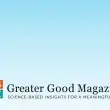Now that the presidential election is over, it’s a good time to take stock of what I was asked to do for my country over the past few years, and what I can expect to be asked of me in the months and years to come.
When President Bush, during his 2002 State of the Union speech, called on me (and my fellow citizens) to do good for our nation by volunteering 4,000 hours, I was moved. I rushed off a letter to the head of the Federal Emergency Management Agency, telling him, “Take my hours, no questions asked— just tell me what you want me to do.” I have yet to hear back.
I would have to return my Ph.D. in sociology to the University of California if I did not realize that it takes more than an inspiring speech to create a fleet of volunteers. Sociologists hold that calls for public service must be “institutionalized.” That is, people must have structured opportunities to serve, so when they get up in the morning full of voluntary gusto, they know where to go and what to do. President Kennedy’s often cited cry to “ask not what your country can do for you” was followed by the formation of the Peace Corps, which has allowed tens of thou¬sands of Americans to do good overseas. The Peace Corps has done us proud as a nation and bettered our youth. Whenever I travel overseas, I keep seeing how other nations have copied this fine American institution.
The Bush Administration institutionalized the president’s call for service in a peculiar way. Its main task has been to take previously well-established voluntary bodies— including the Peace Corps, AmeriCorps, and Senior Corps—and tie them together with a new ribbon, calling them the Freedom Corps. Administrations like to leave their mark on history, and realigning federal agencies and renaming them is one of the most effortless ways of doing so. (See the Department of Homeland Security.) But renaming an agency does not make people jump up and down, overwhelmed by an urge to sign up and serve.
To be fair, the Bush Administration did add a new agency to the 15 members of the Freedom Corps. This is the Citizen Corps, which has been allotted a tiny staff and a minuscule budget. If you’ve heard of the Citizen Corps, you must have a particularly keen sense of hearing. Still, looking for a way to commit my 4,000 hours, I knocked on its doors.
I chose the Citizen Corps because I believed that the United States would need millions of new volunteers if it is to be better prepared for future 9/11-like attacks. Given that we are an open society and that there are countless “soft targets” for terrorism, it seemed obvious that police alone could not patrol all our vulnerable points. When I heard of the Citizen Corps, I imagined volunteers dedicating one weekend day a month, and some hours they could pry loose during the workweek, to help patrol water resources, bridges, dams, and electrical plants. I envisioned citizens learning to staff phone banks so that fire fighters and police could respond to emergencies. And trained in advanced first aid, as emergency medical technicians are, volunteers could even serve as back up for healthcare personnel. It was heartening to read on its website that the Citizen Corps’ mission is to give expression to a post-9/11 “wellspring of selflessness and heroism,” which led “people in every corner of the country to ask, ‘What can I do?’ and ‘How can I help?’”
The Citizen Corps’ answers to these questions is a crushing bore. It largely “coordinates” local and regional volunteer activities conducted by other groups and helps form councils of representatives from various associations and organizations.
In the years that have passed since President Bush’s speech, any inspiration his words might have generated has been squandered. Not surprisingly, Citizen Corps failed to capture the imagination and commitment of the American people. Freedom Corps is barely known. The Bush Administration long ceased to promote either of these agencies, or any other, as an outlet for the “wellspring” of American volunteerism. The administration was so eager not to impose any demands on voters that it was even reluctant to reiterate the president’s call for more volunteering. It didn’t help that it was also fighting fires on so many fronts, responding to loads of criticism abroad and at home about preemptive invasions and tortures and misleading information. As a result, it lost the ability to call on people to do good out of a sense of kindness and com¬mitment to their fellow citizens.
During the presidential campaign, neither President Bush nor Senator Kerry seemed eager to raise the question of what Americans should be asked to do for their country or for one another; instead, they told us what new tax cuts we could expect. Indeed, the nation has been so polarized that any call to the common good might have seemed disingenuous.
But with the election now behind us, I can only hope that President Bush will make a concerted effort to build bridges between red and blue America. Designing new ways for all Americans to work together toward a common goal—especially protecting one another from terrorism—is as good a place to start as any I can imagine.




Comments